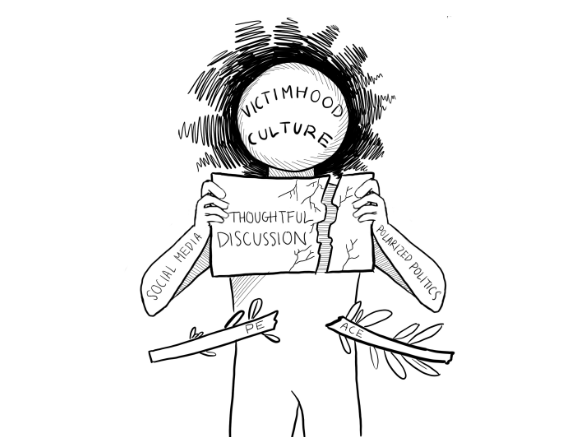Social Media Inflates Culture of ‘Victimhood Chic’
Americans have access to news through plenty of outlets, and social media has emerged to quickly become one the most powerful. By allowing people to quickly access information and opinions online, social media gives people the ability to call out racism, homophobia and bigotry, thus protecting minority communities. However, as social media and the concept of being “woke” rises, so does the creation of a new victimhood culture backed by political polarization. In order to combat this, we must be more cognizant of both discriminatory aggressions and premature statements online.
One prominent example is the recently disproven attack on actor Jussie Smollett, who claimed to have been a victim of a hate crime but was actually revealed to have paid two Nigerian men over $3,000 in order to attack him in an attempt to further his career, according to CNN. According to Chicago Police Superintendent Eddie Johnson, Smollett took advantage of the pain of racism in today’s politically-charged environment.
When the story was initially released to the public, many people, particularly celebrities and politicians, jumped in support of Smollet. This bandwagon effect backfired as more information about the investigation was released that shifted Smollett’s image from tragic victim to potential suspect.
Many Democratic politicians, including House Speaker Nancy Pelosi, presidential candidate Kamala Harris and Sen. Kirsten Gillibrand, tweeted only days after the allegation in support of Smollett, connecting the incident to the larger issue of discrimination during president Trump’s administration. Pelosi later deleted her tweet, and Gillibrand followed up by touching on an important problem in the nation: people prefer following waves of outrage created by social media over resisting judgement until all facts have been confirmed
The investigation result reveals an unsettling element of the 21st century. Today’s political media plays into “victimhood chic,” as dubbed in an article from The Atlantic, by blindly inflating incidents, thus furthering the personal agendas of both politicians and victims. Smollett, while an extreme case, is one example of many who have taken to emphasizing their victimization or how these victims discuss controversial topics like race.
That is not to say that all victims fall into this new culture; social media, after all, has allowed people to support individuals who have faced bigotry and, to some extent, educate others about racism, sexism, homophobia and more. For instance, according to the Public Health Institute, the Black Lives Matter movement made a strong impact on the community through social media, with #BlackLivesMatter the third most-used hashtag about social issues on Twitter in 2016.
On the other hand, there is a fine balance between vigilantly standing against harassment and enforcing a rigid moral dichotomy between the oppressed and the privileged. A common example of this can be found in safe spaces on many college campuses. Civil and political rights activist Van Jones spoke at the University of Chicago in 2017 about the potential ramifications of safe spaces.
In his speech, Jones argued that insulating students prevented them from achieving one of the main purposes of university: exposure to different ideas, even those that might be offensive and controversial. Here, by giving students the ability to raise issues to administration at the blink of an eye, society creates another line between advocating for marginalized individuals and sheltering them.
As consumers of media, we should be more aware of biases or missing information in stories before making our own judgments. We should consume a variety of different opinions before seeking to form our own, rather than jumping on a bandwagon of offense because it is easier.
More importantly, as a society we should be able to have mature discussions about topics where both parties leave the conversation more knowledgeable and open-minded; while this is difficult in times of frustration, it is better than devolving to unwarranted and counterproductive attacks on one another. By calmly seeking open-mindedness rather than staunchly refusing to consider other perspectives, our society can diminish victimhood culture.
Your donation will support the student journalists of Portola High School. Your contribution will allow us to purchase equipment and cover our annual website hosting costs.

Annie Qiao is your 2019-20 Arts & Entertainment Editor for her fourth year at the Pilot! As a passionate admirer of the arts, she hopes to bring a...




